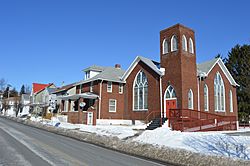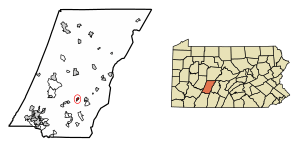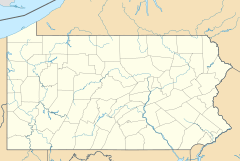Wilmore, Pennsylvania facts for kids
Quick facts for kids
Wilmore, Pennsylvania
|
|
|---|---|
|
Borough
|
|

Main Street
|
|

Location of Wilmore in Cambria County, Pennsylvania.
|
|
| Country | United States |
| State | Pennsylvania |
| County | Cambria |
| Settled | 1831 |
| Incorporated | 1859 |
| Government | |
| • Type | Borough council |
| Area | |
| • Total | 0.33 sq mi (0.86 km2) |
| • Land | 0.33 sq mi (0.86 km2) |
| • Water | 0.00 sq mi (0.00 km2) |
| Elevation | 1,555 ft (474 m) |
| Population
(2010)
|
|
| • Total | 225 |
| • Estimate
(2019)
|
205 |
| • Density | 617.47/sq mi (238.64/km2) |
| Time zone | UTC-5 (Eastern (EST)) |
| • Summer (DST) | UTC-4 (EDT) |
| ZIP code |
15962
|
| Area code(s) | 814 |
| FIPS code | 42-85528 |
| GNIS feature ID | 1215039 |
Wilmore is a small town, also known as a borough, located in Cambria County, Pennsylvania, United States. It is part of the larger Johnstown, Pennsylvania area. In 2010, the town had a population of 225 people.
Contents
Geography of Wilmore
Wilmore is found in the southern part of Cambria County. It sits in the valley of the Little Conemaugh River. The town is about 8 miles (13 km) south of Ebensburg, which is the county seat.
Other nearby towns include Portage, which is 3 miles (5 km) to the east. Summerhill is 3 miles (5 km) to the west. Johnstown, the biggest city in the county, is about 16 miles (26 km) southwest.
The United States Census Bureau says that Wilmore covers a total area of 0.33 square miles (0.86 square kilometers). All of this area is land.
Wilmore's Population
| Historical population | |||
|---|---|---|---|
| Census | Pop. | %± | |
| 1860 | 405 | — | |
| 1870 | 393 | −3.0% | |
| 1880 | 310 | −21.1% | |
| 1890 | 350 | 12.9% | |
| 1900 | 264 | −24.6% | |
| 1910 | 314 | 18.9% | |
| 1920 | 438 | 39.5% | |
| 1930 | 346 | −21.0% | |
| 1940 | 410 | 18.5% | |
| 1950 | 390 | −4.9% | |
| 1960 | 339 | −13.1% | |
| 1970 | 386 | 13.9% | |
| 1980 | 299 | −22.5% | |
| 1990 | 277 | −7.4% | |
| 2000 | 252 | −9.0% | |
| 2010 | 225 | −10.7% | |
| 2019 (est.) | 205 | −8.9% | |
| Sources: | |||
In the year 2000, Wilmore had 252 residents. There were 89 households and 64 families living in the borough. The population density was about 746 people per square mile (288 people per square kilometer). All of the residents were identified as White.
History of Wilmore
Early Beginnings and the Underground Railroad
Wilmore has an interesting history, including a connection to the Underground Railroad. This was a secret network that helped enslaved people find freedom. Author William J. Switala wrote that Wilmore was part of a route from Johnstown to Ebensburg.
A former enslaved man named Godfrey Wilmore is believed to have founded the community. He was born around 1751 in Cumberland, Maryland. Godfrey Wilmore passed away in Wilmore on April 2, 1815. He was buried in Loretto, Pennsylvania.
Godfrey Wilmore's Life
Godfrey Wilmore was a freed slave of African descent. He was known to be very smart and could read and write. This was unusual for enslaved people at that time. It suggests he might have been a "house slave" or a supervisor.
He worked extra jobs to earn enough money to buy his freedom. After gaining his freedom, he also bought the remaining time of his wife, Mary Higgins, who was an indentured servant from Ireland. Godfrey Wilmore even became the first teacher in the area around Wilmore.
Around 1800, Godfrey and Mary Wilmore moved from Maryland to Pennsylvania. They first settled in a place called "Jimmy Rhey Place." They were important pioneers in forming Summerhill Township and Cambria County. Godfrey built the first sawmill in the area on the Little Conemaugh River.
Religious Conversion and a New Name
Mary Wilmore was Catholic, but Godfrey was a Baptist. A Catholic priest named Father Demetrius Augustine Gallitzin visited the Wilmore family. He had many discussions with Godfrey about religion. Eventually, Godfrey decided to become Catholic.
In 1829, engineers were building the Allegheny Portage Railroad through the area. They called the small village "Guinea" on their maps. This name was offensive to the Wilmore family. Father Gallitzin spoke out against it from the church altar. He insisted the town should be called Jefferson, in honor of President Thomas Jefferson.
Naming the Town Wilmore
Bernard Wilmore, Godfrey and Mary's oldest son, helped plan the town. He changed its name from Guinea to Jefferson on June 4, 1831. The Old Portage Railroad was completed through Jefferson by 1834.
However, the name Jefferson never really stuck. The local post office and train station were always called "Wilmore's Post Office" and "Wilmore's Station." Because of this, the town was officially named Wilmore when it became a borough in 1859. At that time, there were about 20 homes.
Mary Wilmore, a daughter of Godfrey and Mary, married James Young. He was a contractor and built the current St. Bartholomew's Church in Wilmore in 1854. This Gothic-style church replaced an older stone church.
Images for kids
See also
 In Spanish: Wilmore (Pensilvania) para niños
In Spanish: Wilmore (Pensilvania) para niños
 | Mary Eliza Mahoney |
 | Susie King Taylor |
 | Ida Gray |
 | Eliza Ann Grier |



